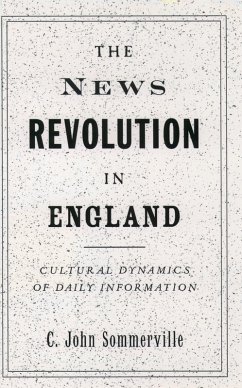The News Revolution in England: Cultural Dynamics of Daily Information is the first book to analyze the essential feature of periodical media, which is their periodicity. Having to sell the next issue as well as the present one changes the relation between authors and readers--or customers--and subtly shapes the way that everything is reported, whether politics, the arts and science, or social issues. So there are certain biases that are implicit in the dynamics of news production or commodified information, quite apart from the intentions of journalists. With the birth of the commercial periodical in late seventeenth century England, news became a commodity. What constituted news, how it was presented and received, and how people responded to it underwent a fundamental change. Rather than any democratic print revolution, in which the masses suddenly had access to cheap and accessible information, C. John Sommerville shows that the arrival of the commercial press was in fact restrictive, dictating what was discussed and ultimately how it was discussed.
The News Revolution in England looks at the history of journalism from an entirely different angle--the effect of the medium rather than the intentions of the journalists. It will be of interest to historians of England, journalism, and news, along with anyone interested in how the media shapes our world and how we come to relate to it.
Dieser Download kann aus rechtlichen Gründen nur mit Rechnungsadresse in A, B, BG, CY, CZ, D, DK, EW, E, FIN, F, GR, HR, H, IRL, I, LT, L, LR, M, NL, PL, P, R, S, SLO, SK ausgeliefert werden.









